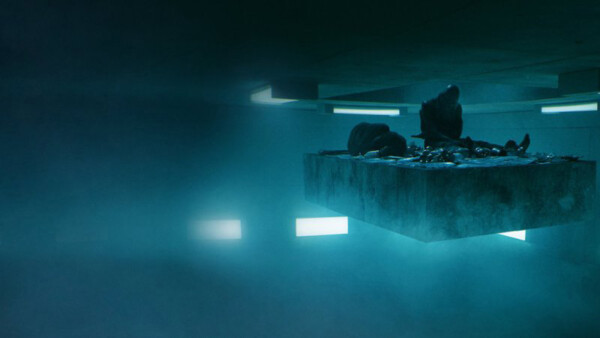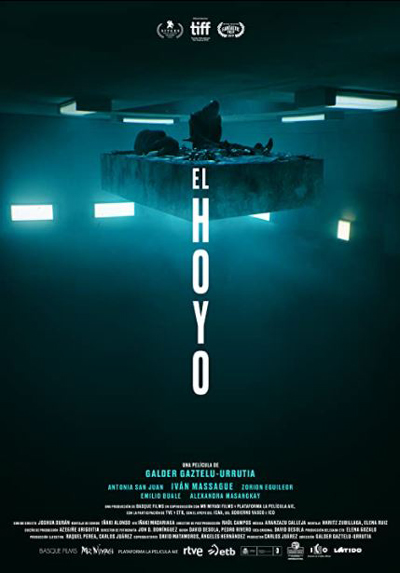Mladen and Del review ‘The Platform’

Image courtesy of Netflix.
“The Platform” (“El Hoyo”) Starring Ivan Massagué (Goreng), Zorion Eguileor (Trimagasi), Antonia San Juan (Imoguiri) and others. Directed by Galder Gaztelu-Urrutia. Rated for mature audiences. 1 hour, 34 minutes. Netflix.
Mladen’s take
“The Platform” is a very good movie that could’ve been great but for its descent into gratuitous violence.
How potentially great? The Spanish equivalent of South Korean “Parasite.” That’s how great. Recall that “Parasite” won the 2020 Oscar for Best Motion Picture. It was the first time a foreign film got the most prestigious nod from the Motion Picture Academy.
“The Platform,” perfectly kitted by a simple, soul‑scraping score from Aránzazu Calleja, buttresses what should be clear to all of us by now. Most humans are savages. There’s nothing those of us who aren’t can do about it.
Titled “El Hoyo” (The Hole) in Spanish, “The Platform” is a parable on many levels. Here’s the skinny, assuming I can summarize the movie’s plot.
The hoyo is an underground skyscraper with a rectangular cut centered on each subfloor. A levitating platform, a big ole block the parameter of an opulent dining table, packed with all sorts of food moves down through the subfloors, some three hundred of them. It stops at each subfloor, where the two often self-imprisoned occupants have 2 minutes to dine on whatever food there’s left. The inevitable kicker. The farther the platform descends the less food for the people below. Get it? It’s better to be on top.
Every 30 days, the Powers That Be gas the hoyo to move around the occupants. Those who were once at the top and had access to food before it disappeared may end up at the bottom and not get even scraps. The randomness of the monthly vertical displacement means hoyo occupants must prepare for survival, which often translates into murder and cannibalism, all of it vividly depicted again and again. Unfortunate. An imaginative, nicely acted movie about class gets distorted by “Hostel”-like violence. Let me say it again. Unfortunate.
There is terrific dialogue in this film. Goreng maintains most of his humanity, Trimagasi’s stark realism is understandable, and Imoguiri comes up with a solution for getting as many people as possible fed with the very limited supply of food on the platform. Her idea fails. Those above are unwilling to share with those below.
Maybe “The Platform” also riffs the fascist regime of Franco, who ruled Spain for decades starting in the late 1930s. There’s speculation by a character in the film – may have been Trimagasi, I can’t recall – that the Government was using the Hole as a social experiment to determine when regular folk would be pushed to the brink of cooperating to conquer mutually shared adversity such as hunger. Why? Because the underprivileged, who are always a vast majority of society, could coalesce into a rebellion with revenge as the goal if pushed too far. Who would be the target? The privileged, of course, including Government officials. Neat. The Government is trying to quantify how oppressive and depraved it can be before the masses take action to alter their miserable lives.
“The Platform” is a B+ 1 point from an A-. It pains me to give this terrific movie that grade. “El Hoyo” starts strong, stays strong to mid-point, and then deteriorates toward sadism to an unclear ending. Less splattering blood and fewer depictions of people carved for eating and, poof, “The Platform” would’ve reached A-land. Off I go to relive the film through Calleja’s masterful music, particularly “La Plataforma.” Oh, that insidious, almost lighthearted but certainly tinny tick-tocking as time to be humane runs out.

Del’s take
It’s not merely the Christmas spirit of charity that compels me to agree with Mladen. “The Platform” is a terrific movie ruined – for me, anyway – by graphic, stomach-churning violence. I don’t recommend it to anyone but those who can stomach extreme and bloody sadism.
A shame because it has crucial things to say about humanity, especially today, with knuckle-dragging, hate-spouting anti-intellectuals squabbling like pigs in a slophole over the dwindling largesse this planet has to offer. In fact, as the platform descended floor by floor, its offerings growing meager as it edged closer to an inferno of starvation and depravity, I saw the metaphor clearly:
That’s the world today. We are those people.
Speaking of which, moviegoers will not and have not embraced “The Platform” because they will not and have not embraced movies that offer such a bleak appraisal of the human condition. I maintain the portrayal is spot-on: With climate change, dwindling resources, division and untruth, a weird service-based economy and rampaging pandemics all around us, how can feeling good be a priority? What humanity needs is a swift kick in the ass and an admonition to get out there and change the world for the better. But that won’t happen, ever.
Most illustrative was the attitude changes of the people who shifted floors every month. A plan of action advanced by Goreng was that if each floor took only what it needed, even the people on the lowest levels would have something to eat, averting starvation and violence. Presumably the people on the lower levels, having suffered the greed and waste of those above them, would support such a strategy, but no. When they advance to the higher, more food-plentiful levels, the former low-level inhabitants become swine wallowing in an every-man-for-himself philosophy. Even when Goreng and a fellow cellmate try to organize the occupants of The Hole, or enforce their policy of selflessness, they’re defeated by anger and violence.
I watched this and was reminded of 2005, after Katrina devastated New Orleans and Fort Walton Beach became home to a flood of refugees from Louisiana who were buying gas, water and food and driving it back to the zone of destruction. I saw locals piling into gas stations, filling up the tanks on their gas-guzzling boats and personal watercraft as the lines grew longer and longer, and I wrote a column about it, admonishing those people to abstain from their personal pleasure so that our fellow Americans to the west could get back on their feet. The emails and letters I received were depressing – from people vowing to run all the gas out of their boats and return for a second helping, or more pointedly, that I go fuck myself.
For me that incident became a blunt illustration of humanity’s inherent savagery as Mladen put it, and I suppose “The Platform” seeks to be equally blunt. I personally could not get behind the blood, gore and depravity. Mladen argues the movie would have been better without all that but I’m not sure. I think when you soften the message, the message is lost on a lot of people. Subtlety is not one of our better qualities.
The ending? I won’t talk about the ending except to say it is dark. Literally. And darkness has always served as a metaphor for ignorance, decline, and evil.
Brace yourself for “The Platform.” You’ll never see it on The Hallmark Channel and that’s a good thing. When you’re done watching it, go out and do something unselfish. Make the world a tiny bit better.
Mladen Rudman is a technical writer and former journalist. Del Stone Jr. is a former journalist and writer.
![]()
Leave a Reply